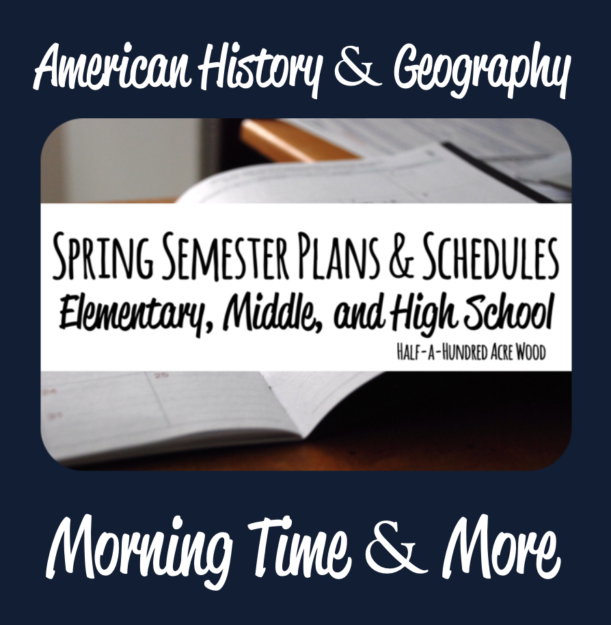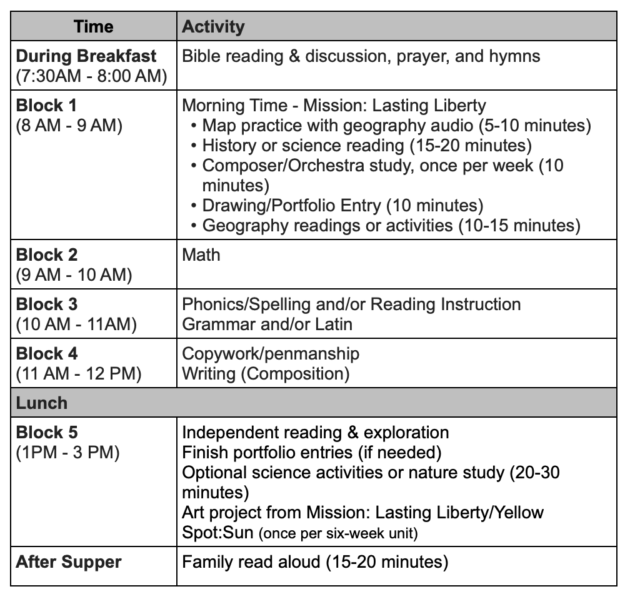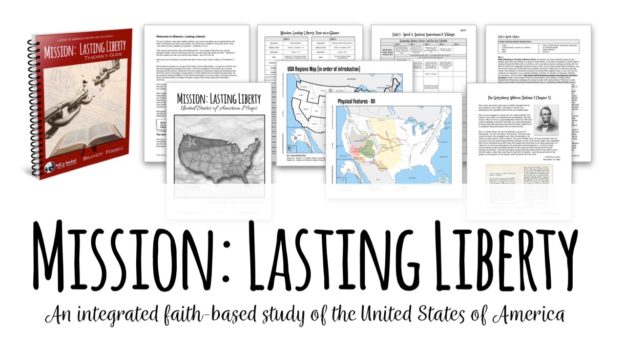
Teach us to number our days, that we may gain a heart of wisdom. Psalm 90:12, NIV
The January and February winter months possess great potential for disrupting the ideal. As we enter this “third lap” of the school year, just know that it’s okay to rethink goals. It’s okay to set aside curriculum. It’s okay to slow the pace. It’s okay to take time to enjoy family. It’s not just okay, it’s necessary.
While part of numbering our days aright is planning well, part of numbering our days aright is letting go of those plans when God has something else in store for our family.
Homeschooling is about relationships, not curriculum. It’s about our relationship with God, our relationship with each other, and our relationship to the world around us. If we seek first the kingdom of God, all of the other things will fall into place.
With that in mind, we share our homeschool plans for the spring semester.
Our Read Aloud Selections for Second Semester:
We’ll start with our favorite: sharing stories together as a family! We usually read a book together in the evenings the hour before we go to bed. These read-alouds are part of our Mission: Lasting Liberty study. This collection of biographies provides a glimpse of how God has used willing vessels to extend love and compassion through the conflicts of 20th century American history. (Note: For each book within our curriculum plan, we have linked to our shop. We always offer free shipping on physical orders over $100.)
D.L Moody: Bringing Souls to Christ. While pursuing his dreams of becoming a wealthy businessman, D.L. Moody felt the call of God to go into evangelism to proclaim the Gospel to the nation and abroad. Moody served his fellow man through Civil War outreach, his Sunday school and church, and revival campaigns in America and abroad.
George Washington Carver: From Slave to Scientist. Overcoming racism and poverty, George Washington Carver became a brilliant scientist and professor who used his gifts to help others escape poverty. The experimentation of this ingenious scientist overlaps well with our study of food science in Properties of Matter.
Jacob DeShazer: Forgive your Enemies. A prisoner of war captured by the Japanese during World War II, Jacob DeShazer later returned to Japan to serve his former enemies as a missionary. Powerful, powerful story!
Ben Carson: A Chance at Life. Known for his gifted hands, former neurosurgeon Ben Carson overcame poverty, racism, and poor grades to become a renowned physician who directed pediatric neurosurgery at Johns Hopkins for over 25 years. (We also highly recommend Gifted Hands and You Have a Brain for both teens and adults! It will give you much to think about and discuss!)
As we read through the above biographies, we’ll also read a living history of the events and people of America from the early 1900s to today using the last half of America’s Story Volume 2 and America’s Story Volume 3. We’ll continue learning about U.S. Presidents from Don’t Know Much about the Presidents as they correspond to our history readings, and we’ll enjoy hymn study, scripture memorization, drawing and art projects (connected to history), and American composers. And we’ll continue studying U.S. Geography as it corresponds to the other parts of our study using the Desk Atlas of the United States and Draw the USA. And last but not least, we’ll embark on a fascinating introduction to chemistry with the Properties of Matter.
If you’d like to join us in Mission: Lasting Liberty mid-year, you’ll need the books in our Mission: Lasting Liberty package minus the following: God’s Design for Life: The Human Body, America’s Story Volume 1, William Bradford, Ransom’s Mark, and Harriet Tubman.
Schedules
We usually read our read-alouds in the evenings after supper. We also have a Morning Time (Mission: Lasting Liberty) consisting of short readings and/or activities we’d like to do to jumpstart our school day. Our schedule looks a bit like this on an ideal day:

This schedule is not set in stone. Sometimes we’re not even all awake by 7:30! In reality, our homeschool is more of a juggling act. After our morning time (which consists of readings and/or activities we use to jumpstart our school day), our high schoolers follow an independent schedule, choosing the order in which they complete assignments, and they engage me in discussions or ask questions as needed. When I’m working with our youngest, his brothers are working on something they can do without my assistance so that they don’t interrupt. Before we started integrating fine arts and other subjects, and before we made the Great Commission the focus of our learning endeavors, our bare bones schedule looked more like this:

As time has progressed, our schedule has certainly morphed. Now that we have students at all levels of learning, a checklist/schedule is so helpful for all of us. I have one printed for each one of them!
Morning Time – Mission Lasting Liberty
Our morning time consists of Bible/devotion, hymn study, geography, science, history, composer study, and art projects. (See the Morning Time section in the first schedule above.) Not every morning includes all of these subjects but they’re scheduled/paced out in a simple format in the Mission: Lasting Liberty Reading Plan.
Morning time usually takes us about 45 minutes to complete, unless an art project or science experiment is scheduled. For those who would like a sneak peek at it in real life, I provided an overview of the history portfolio entries, science activities, and art projects we completed last semester. The general plan for the remainder of the year is…
Bible. We begin our days with reading the Bible each morning and discussing as a family. This year, our Bible readings and devotions are related to world missions. This semester, we’ll be reading and memorizing selections from 1 John, Philippians, Ephesians, Matthew, and Proverbs.
Hymn Study. We’re studying hymns that are correlated with the missionary or historical context using the book Then Sings My Soul.
Science. This semester, we’ll be using God’s Design for Chemistry & Ecology: Properties of Matter for a simple study of experimental science (including the scientific method), measurement, matter, elements, compounds, solutions, and food chemistry.
Geography. We’ll continue memorizing physical features of the United States and memorize how to draw the USA freehand as we also review historical highlights from each state. Resources include the Desk Atlas of the United States and Draw the USA.
Art & Music. We’ll continue with our history-correlated art projects using picture study and instructions from Draw Write Now Book 3 and Draw Write Now Book 5. We also look forward to the final three art projects (a locomotive, a Model T Ford, and a space shuttle) from Yellow Spot:Sun’s Trailblazing Transit course. We’ll also continue with our study of composers and orchestra using A Child’s Introduction to the Orchestra. This semester, we’ll be introducing Gershwin, Copland, and Bernstein while also learning about the brass and percussion sections, and we’ll review Debussy, Stravinsky, and Schoenberg along with the other sections of the orchestra that we covered last semester.
History. We finished America’s Story Volume 1 and worked midway through America’s Story Volume 2 last semester, so we’ll be continuing with the latter half of America’s Story Volume 2 along with America’s Story Volume 3 this semester.
Can you believe all of that usually takes less than an hour daily? The only exception is when we have an occasional art project, nature walk, or one of the longer science activities, but we usually postpone those to the afternoon. Download a sample of Mission Lasting Liberty here and read reviews on our Testimonials page.
You can start this curriculum mid-year! If you’d like to join us in Mission: Lasting Liberty mid-year, you’ll need the books in our Mission: Lasting Liberty package minus the following: God’s Design for Life: The Human Body (Student + Teacher), America’s Story Volume 1, William Bradford, Ransom’s Mark, and Harriet Tubman.
Mid-Year Curriculum Update
For those who are interested in what we use for other subjects (at all levels – elementary, middle, and high school) here’s the lowdown on what we’re using this semester beyond Mission: Lasting Liberty. If you have questions about any of these options, please just let us know!
NOTE: This post is a snapshot in time for our family in 2019 when we still had four sons in K-12. For an updated list of curriculum choices and literature selections for 2023-2024 (for our three remaining sons which are now in 4th grade, 9th grade, and 12th grade), click here.
First Grade
At this age, we go at a pace that fits the student, allowing ample time for play. We aim to keep our schedule and curriculum choices limited to reading, writing, and arithmetic until about 2nd or 3rd grade. Aside from the following, he’s coloring, drawing, and listening to us read bunches and bunches of books!
- Reading/Phonics: Finish All About Reading Level 1 and start All About Spelling Level 1. Read more about the All About Reading program here.
- Writing: Script-n-Scribe Letter Connector. We start our boys with cursive. Read why here.
- Arithmetic: Singapore Math Primary Mathematics. (Workbook | Textbook)
- Social Studies, Science, and Fine Arts: Mission: Lasting Liberty during morning time. We also plan to continue with Trailblazing Transit for art project tutorials that correspond nicely with Mission: Lasting Liberty. (Click to see our finished projects thus far: Native American Canoe | Lewis and Clark’s Keelboat | Pioneer’s Wagon
6th Grader
Our middle schooler will follow the middle school options within Mission: Lasting Liberty for science, history, and civics.
-
- Mission: Lasting Liberty Subjects
- Scripture Memorization & Bible Study: Family Bible readings, hymns, and scripture memory from Mission: Lasting Liberty. Personal Bible study from The Ology.
- History & Constitution Study: Mission: Lasting Liberty. (Includes keeping a history portfolio.)
- Geography/Cartography: Mission: Lasting Liberty. (Includes making a homemade U.S. States Atlas and drawing the USA freehand.)
- Science: Mission: Lasting Liberty. (Includes keeping a lab journal.)
- Fine Arts: Orchestra/composer and art study from Mission: Lasting Liberty and Trailblazing Transit.
- Scripture Memorization & Bible Study: Family Bible readings, hymns, and scripture memory from Mission: Lasting Liberty. Personal Bible study from The Ology.
- Math: Math Mammoth
- Language arts:
- Spelling: All About Spelling (20 minutes). Read more about this program here.
- English Grammar: Fix-It Grammar – Level 3 (15 minutes) Teacher’s Manual comes with a downloadable student book. Read more about Fix-It Grammar here. Additional grammar instructions is through Latin.
- Composition: IEW U.S. History-Based Writing Lessons. Remaining literature selections:
- Penmanship & Poetry Memorization: Script-n-Scribe Americana (5-10 minutes). During final 12 weeks, instead of memorizing new poetry, he wants to complete Grammar of Poetry. When he witnessed his older brother using Grammar of Poetry last year, he asked to add Grammar of Poetry to this year.
- Mission: Lasting Liberty Subjects
-
- Latin: Because our 6th grader will be using Visual Latin in 7th and 8th grade, he will be learning Greek and Latin word roots using Word Up Volumes 1, 2, and 3 from Compass Classroom (Compass Classroom’s website is temporarily down). Try sample lessons. (Last semester, he completed the first 10 lessons of Visual Latin 1. Try sample lessons.)
9th Grader
Our 9th grader is earning 7 high school credits this year: U.S. History (1 credit), English I (1 credit), Civics (1/2 credit), Keyboarding (1/2 credit), Health (1 credit), Physical Science (1 credit), Math (1 credit), Foreign language (1 credit). We have considered waiting until his senior year for the civics credit, since he will be in 12th grade when we cycle back through U.S. History. (So, this may drop down to 6.5 credits.)
The following subjects overlap content from our Mission: Lasting Liberty program, providing a one-room schoolhouse atmosphere:
- History: Dave Raymond’s American History. (We love this history course! Read our review here. Download 4 free lessons: American History)
- Literature & Composition: IEW Advanced U.S. History Based Writing Lessons. Remaining American Literature selections include:
- Adventures of Huckleberry Finn
- Up from Slavery
- To Kill a Mockingbird
- The Old Man and the Sea
- American Literature by Whit Jones. This worldview-driven anthology contains poetry, essays, and prose by famous authors from the Colonial Age to Modern Times. It qualifies as 2 English credits for literature and composition, but we are only using it for readings and to reference discussion questions. You can also grab the corresponding student notebook.
- Health & Nutrition: Exploring Creation with Health & Nutrition. This course qualifies as a full credit.
- Science: Instead of completing Physical Science this year, we’ve switched to biology, using Devotional Biology from Compass Classroom, which is a better fit for him with its emphasis on theology. (You can download two free lessons here.) We started out with Apologia’s new edition of Exploring Creation with Physical Science, but we decided it would be a better fit to study biology while studying Health & Nutrition. We plan to return to physical science next year. NOTE: If using Exploring Creation with Physical Science, we recommend sticking with 2nd edition until errors are corrected within the 3rd edition.
- Civics (tentative): Exploring Government from Notgrass. Because we dropped Civics from our first semester plans, we’re attempting it once again this semester. It’s the one subject we’re willing to set aside this year since we’ll be returning to American history studies his senior year. If you prefer a video-based course focusing primarily on the U.S. Constitution and supreme court cases, you can check out Constitutional Literacy (from HSLDA) or Constitution 101 (a free on-line course from Hillsdale College; there are several other Civics-related courses under the “Politics” heading).
Other subjects:
- Personal Bible Study: New Testament Epistles.
- Math: Foerster Algebra 1.
- Latin: Visual Latin 1 alongside Lingua Latina, a book written entirely in Latin. Try sample lessons here and read a detailed review of this program here. Also download this Free Visual Latin & Henle Teaching Guide if you’re using Henle First Year Latin. (As an alternate for those studying Henle, the Memoria Press First – Fourth Form Latin series is a four-year curriculum that completely replaces Henle First Year Latin. After finishing the form series, students are prepared to enter Henle Second Year Latin.)
12th Grader
Our 12th grader only needs two credits to graduate: Advanced Math and English IV. He’s already earned 9 hours college credit due to his score on the ACT and a history CLEP test. This year, he aims to take additional CLEP tests in history and political science (and possibly math.) Currently, he’s looking at majoring in biochemistry, but he is taking a course in physics this year to see if he would rather pursue a degree in that field. What’s listed here is what he has chosen to study.
- Personal Bible Study: New Testament Epistles
- Science: Exploring Creation with Physics.
- Math: Math-U-See Pre-Calculus.
- Exposition & Composition: A combination of IEW Classical Rhetoric with Structure & Style and Fitting Words – Classical Rhetoric. He has LOVED this combination for his senior composition class! His remaining personal literature selections include:
- Speeches/oratory from ancient through modern times (from Fitting Words)
- Augustine’s City of God. St. Augustine of Hippo was the greatest Christian philosopher of Antiquity, and City of God is considered his greatest work, as it influenced Western society and Christian thought more powerfully than perhaps any other book except the Bible. It has shaped some of the most important intellectual, theological, and political issues of the Western world. (Time permitting, he may also read The Confessions of Saint Augustine.)
- Dante Alighieri’s Divine Comedy. The union of the Christian and classical tradition, Divine Comedy is an epic allegorical poem about Dante’s spiritual journey of redemption.
- Shakespeare’s Henry V. A history.
- Shakespeare’s Hamlet. A tragedy. He may reference the first four lectures of Hillsdale’s free course on Shakespeare.
- Shakespeare’s Much Ado About Nothing. A comedy.
- *Other titles will be chosen from a list of world literature.
- Extras:
- History: This year, he’s auditing Dave Raymond’s Modernity course because he enjoys them so much. Download 4 free lessons: Modernity (Modern World/American History)
- Preparation for additional CLEP exams
On paper, it may seem a bit overwhelming, but in real life, even our oldest son is usually done by 3pm. In fact, I’m continually amazed at how wonderful homeschooling has become for us as we seek first the kingdom of God!
As we head into a new semester remember that “God is faithful, more than capable to be faithful to the end – and finish what he started.” – MercyMe
If you ever have questions or want to bounce ideas off another homeschool family, just give us a shout! We’d love to hear from you!





